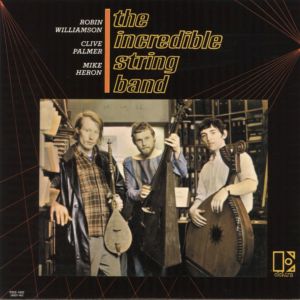
- Format: MP3

Japan 24-Bit Remaster
The Incredible String Band is the band's eponymous debut album. Released in 1966, it is the only Incredible String Band album to feature the original trio line-up with Clive Palmer as well as Robin Williamson and Mike Heron.
The trio had been signed to Elektra Records by Joe Boyd, who had seen them play in Glasgow. They recorded the album at the Sound Techniques studio in London in one or two days in May 1966, with Boyd as producer. Boyd insisted on focusing on the group's own self-written material, rather than the traditional songs and tunes which they had also been performing. This marginalised Palmer, who wrote and sang on only one track, and played on only four others.
The band's imagery is less prevalent on this album than on their later albums, although the liner notes, by Heron, include a surreal tale of the band's encounter with a magic blackbird. Unlike their later work, the instrumentation is relatively orthodox (mostly guitars, fiddle, mandolin and banjo), but the album does contain unconventional tunes and singing styles. Heron later described the album as his favourite.[1]
The album was released in Britain in June 1966, and in the USA, and showcased their playing on a variety of instruments. It won the title of "Folk Album of the Year" in Melody Maker's annual poll, and in a 1968 Sing Out! magazine interview Bob Dylan praised Williamson's "October Song" as one of his favorite songs of that period.
The original LP sleeve used in the UK showed the band holding obscure musical instruments in Boyd's office in London. For the USA issue, a different photo was used, showing the three musicians posed on what appears to be a rusting bus.
The trio broke up immediately after recording the album, but Heron and Williamson reunited after a few months to continue the band's name as a duo, later augmented by other musicians.
The debut release from the original Incredible String Band trio — Robin Williamson (violin/whistle/mandolin/guitar/vocals), Clive Palmer (banjo/guitar/vocals), and Mike Heron (guitar/vocals) — was also their most simple. It is this minimalism that allowed the natural radiance of the band's (mostly) original material to be evident in the purist sense, and likewise without many of the somewhat intricate distractions and musical tangents that their future work would incorporate. Immediately striking is the group's remarkable and collective prowess on seemingly all things stringed — hence, their apropos moniker. With an unmistakable blend of distinct instrumentation and harmony vocals, the Incredible String Band take inspiration from traditional music on both sides of the Atlantic. Their impish charm and tongue-in-cheek fairytale mythology also add to their folkie mystique.
This first long-player — originally issued in 1966 — contains a bevy of songs that, while steeped in conventional folk music, are completely unique. This likewise holds true for the three traditional pieces, "Schaeffer's Jig," "Whistle Tune," and the rare Clive Palmer instrumental solo, "Niggertown." Palmer, formerly of the highly underrated Famous Jug Band, would exit the Incredible String Band after this record, and thus the perpetually rotating personnel that would guide the group for the remainder of its existence began, perhaps aptly, at the beginning. The original songs range from light and airy love ballads — such as the Williamson solo "Womankind" or the understated mischief of "Dandelion Blues" — to the high and lonesome sound of Mike Heron's mandolin-driven "How Happy I Am." There are likewise darker — yet no less poignant — tunes such as "Empty Pocket Blues" and the haunting "Good As Gone." While this album is a tremendous launch pad for potential enthusiasts, be aware that every Incredible String Band recording is also extremely individual and reflects the current membership of the group.